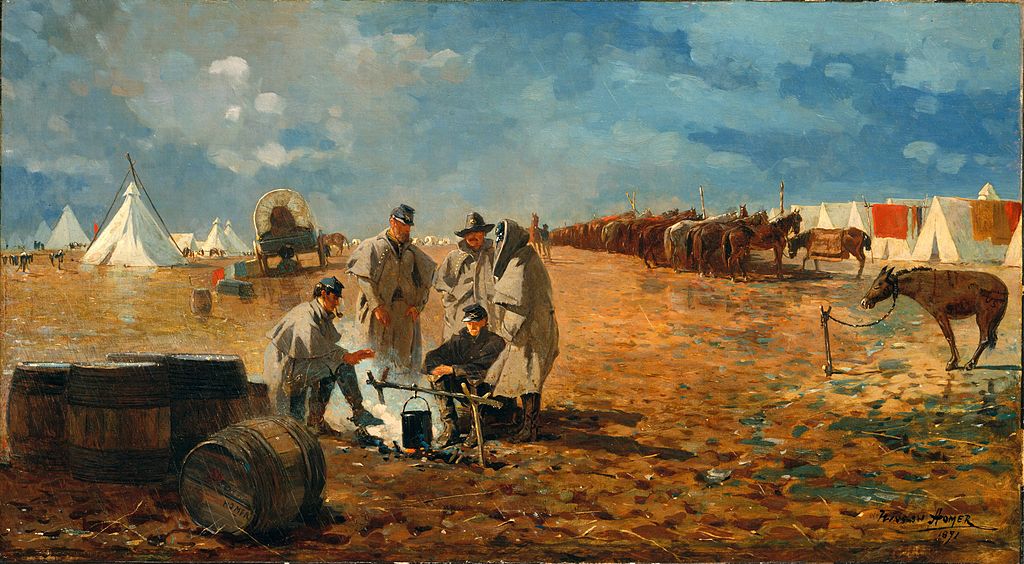The Boys of Potomac rank the Generals
Soldiers on both sides in the Civil War spent a lot of time in camp when they weren’t actively campaigning, and when the routine work of drilling was finished, they had time for a little recreation. One way they spent their free time was with music. There was usually a few musicians in any regiment, and they’d play some popular tunes of the day, ranging from sentimental to serious to humorous. In his book, Hardtack and Coffee or the Unwritten Story of Army Life, John D. Billings of the 10th Massachusetts Battery, recalled one such humorous tune that the soldiers of the Union 3rd Corps sang in the fall of 1863. This song, sung to the tune of “When Johnny Comes Marching Home” was a recollection of all the generals who had led the Army of the Potomac in the first three years of the war. The fact that many of them met with little success is reflected in the song.
We are the boys of Potomac’s ranks
Hurrah! Hurrah!
We are the boys of Potomac’s ranks
We ran with McDowell, retreated with Banks
And we’ll all drink stone blind —
Johnny fill up the bowl
We fought with McClellan, the Rebs, shakes and fever
Hurrah! Hurrah!
Then we fought with McClellan the Rebs shakes and fever
But Mac joined the navy on reaching James River
And we’ll all drink stone blind —
Johnny fill up the bowl
Then they gave us John Pope our patience to tax
Hurrah! Hurrah!
Then they gave us John Pope our patience to tax
Who said that out West he d seen naught but Gray backs
And we’ll all drink stone blind —
Johnny fill up the bowl
He said his headquarters were in the saddle
Hurrah! Hurrah!
He said his headquarters were in the saddle
But Stonewall Jackson made him skedaddle
And we’ll all drink stone blind —
Johnny fill up the bowl
Then Mac was recalled but after Antietam
Hurrah! Hurrah!
Then Mac was recalled but after Antietam
Abe gave him a rest, he was too slow to beat ’em
And we’ll all drink stone blind —
Johnny fill up the bowl
Oh Burnside then he tried his luck
Hurrah! Hurrah!
Oh Burnside then he tried his luck
But in the mud so fast got stuck
And we’ll all drink stone blind —
Johnny fill up the bowl
Then Hooker was taken to fill the bill
Hurrah! Hurrah!
Then Hooker was taken to fill the bill
But he got a black eye at Chancellorsville
And we’ll all drink stone blind —
Johnny fill up the bowl
Next came General Meade, as slow as a plug,
Hurrah! Hurrah!
Next came General Meade, as slow as a plug,
For he let them away at Gettysburg
And we’ll all drink stone blind —
Johnny fill up the bowl
Irvin McDowell was in command in the defeat at First Bull Run. Nathaniel Banks, though a corps commander and not in command of the entire army, had been forced to retreat back to Maryland after being pushed out of Virginia in the 1862 Shenandoah Campaign. George McClellan closed in on Richmond in the Peninsula Campaign, only to be driven back to the James River. At the Battle of Malvern Hill, a Union victory that finally ended the retreat and closed out the campaign, McClellan “joined the navy” by spending the battle on a gunboat in the river.
John Pope had been successful in the west, and bragged that the troops in his battles saw the backs of the retreating Confederates (Gray backs). He also said his “headquarters were in the saddle” which soldiers on both sides found hilarious. Pope was sent to Minnesota after being beaten in the Second Battle of Bull Run in August 1862, and was replaced by McClellan. Although McClellan was victorious at Antietam in September 1862, his failure to pursue the Confederate army and destroy it before the Rebels crossed the Potomac River led to his dismissal in November.
Ambrose Burnside took over and was defeated at Fredericksburg in December, and tried to march again in January 1863, only to be bogged down in muddy roads in heavy rain in what was called the Mud March. Joseph Hooker then took the reins but was defeated at the Battle of Chancellorsville in May 1863. He was followed by George Meade, who was victorious at Gettysburg, but, like McClellan, did not pursue the Rebels who slipped back across the Potomac. Meade was not replaced, and remained the commander of the Army of the Potomac for the rest of the war. (After being named General in Chief of all the Union Armies, Ulysses S. Grant campaigned with the Army of the Potomac, but Meade was the commander).
Amazon affiliate links: We may earn a small commission from purchases made from Amazon.com links at no cost to our visitors. For more info, please read our affiliate disclosure.



